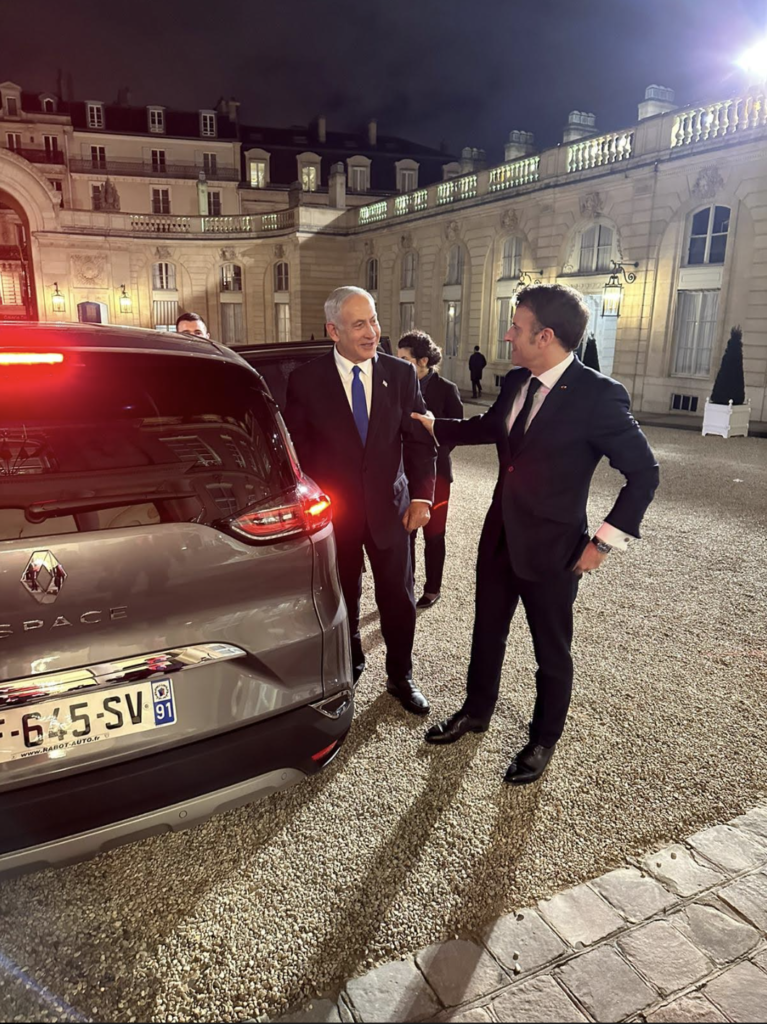
Israeli Prime Minister Benjamin Netanyahu shared his vision for addressing the Iranian nuclear threat during a visit with his French counterpart Emmanuel Macron last week: stronger ‘deterrence’ and ‘significant sanctions’. One day later, France joined the United States and other allies in issuing another criticism of Iranian nuclear activities—although additional sanctions were not mentioned.
Per an Israeli summary of Netanyahu’s meeting with French President Macron, the two leaders “discussed at length ways to confront the Iranian nuclear threat.” The Israeli Premier “stressed that deterrence with Iran and its proxies in the Middle East needs to be strengthened”, while also calling for “imposing significant sanctions on the Iranian regime” and for the European Union to join the US in adding Iran’s Islamic Revolutionary Guard Corps to the terrorism list.
The French readout posted to their Presidency’s website was less specific on ways to address the Iranian threat, instead saying that Macron “reiterated the necessary firmness in the face of Iran’s headlong [nuclear] rush, which if it continued would inevitably have consequences,” according to a translation by Google. Macron also mentioned Iran’s “lack of transparency” in its engagement with the International Atomic Energy Agency (IAEA), which was the focus of France’s statement against Iran on Friday.
The French summary said Macron and Netanyahu discussed their “strong concern over Iran’s destabilizing activities in the entire region,” with Macron also highlighting that Iran’s support for Russia’s war of aggression in Ukraine “exposed Iran to sanctions and growing isolation.” The US has reported that Iran has provided unmanned aerial vehicles (UAVs) to Russia for the Ukrainian war effort, prompting American sanctions against Iran that were expanded again just last week.
Meanwhile, Iran’s nuclear program has been making staggered progress towards nuclear weapons for the last couple of years, despite repeated efforts by the West to bring Iran back into the nuclear deal that traded sanctions relief for restrictions on Iran’s nuclear program. That agreement, known as the Joint Comprehensive Plan of Action, was deemed inadequate by Israel and others—including the US Trump Administration.
After efforts by the US to enhance the accord failed, the Americans withdrew from the agreement in 2018 and reinstated economic sanctions on Iran. The Islamic Republic responded by not only rolling back restrictions on their nuclear program enacted as part of the JCPOA, but by going further down the path towards nuclear weapons than ever publicly acknowledged. This included reaching 60% purity in their uranium enrichment, which approaches the 90% needed for weapons-grade nuclear fuel.
Another breach in Iran’s nuclear responsibilities was addressed in France’s joint statement on Friday, in which Paris, the US, Germany and the United Kingdom rebuked Iran for “a substantial change in the configuration of some of its centrifuges without informing the [IAEA] in advance.” The focus of the concerns was more on the lack of transparency, which the Western allies noted is part of Iran’s responsibilities as part of the Nuclear Non-Proliferation Treaty (NPT)—a more serious and well-established international accord than the JCPOA. Making the incident more disconcerting is that it took place at the Fordow nuclear facility where centrifuges are producing the 60% enriched nuclear fuel.
“Such lack of required notifications undermines the [IAEA’s] ability to maintain timely detection at Iran’s nuclear facilities,” said the joint statement, which was published by the US State Department. “The newly reported change in configuration of centrifuge cascades used to produce near-weapons-grade uranium underscores the need for Iran to meet all its safeguards reporting obligations and to accept whatever safeguards monitoring the IAEA sees as necessary in light of Iran’s production of such highly enriched uranium.
…We recall that the production of high-enriched uranium by Iran at the Fordow Enrichment Plant carries significant proliferation-related risks and is without any credible civilian justification.”
The international critique dismissed Iran’s claims that the failure to timely communicate the change to the IAEA was an error and again called upon Iran to “fully cooperate” with the IAEA—including on outstanding nuclear matters.
While Netanyahu’s call for additional sanctions against Iran to curb the nuclear threat was so far unheeded by France, he nonetheless described last Thursday’s meeting with Macron as “their best meeting ever.”
Per a summary of Netanyahu’s comments to the French Jewish community leaders during his visit to the country on Friday, published by his office, the Israeli Prime Minister told the locals that he and Macron “had discussed Iran, Saudi Arabia and Africa and said that while their positions were not identical, they were getting closer.”
(By Joshua Spurlock, www.themideastupdate.com, February 5, 2023)
